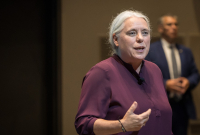Support strong Canadian climate journalism for 2025
Coalition Avenir Québec, which is neck-in-neck with the Liberal party to form the next provincial government of Quebec, is in hot water with environmentalists.
The controversy stems from comments made by CAQ leader François Legault. Legault recently said in a Radio-Canada interview that he wasn't ruling out shale fracking in Quebec’s grand nord for "socially acceptable" projects. Last June, the Liberal government in Quebec announced a ban on fracking, which is short for "hydraulic fracturing," a technique where a mixture of water, sand and chemicals is blasted through rock to release oil and gas. Fracking has not been banned outright anywhere in Canada, but there are moratoriums in Nova Scotia and New Brunswick, and British Columbia ordered a scientific review of fracking by the end of the year.
Forty-five Quebec scientists, professors and other citizens circulated an open letter railing against Legault's comments and asking him to reconsider. “We want to make this election a pivotal moment, where people can evaluate the old destructive options and the new green options for the future and make a decision based on that,” one of the letter's signatories, Jesse Greener, a chemistry professor at the University of Laval, said in an interview with National Observer. The letter asked Legault for a commitment to ban all types of non-conventional fossil fuel extraction techniques in “any rock, be it shale, limestone, sandstone, dolomite.” The Petroleum Resources Act only bans fracking in shale.
The CAQ is in a competitive position against the incumbent Liberals, according to the latest polls during the campaign for the Oct. 1 Quebec election. “It's very bad positioning of the CAQ to leave that door open," Sidney Ribaux, executive director of Équiterre, said. "If there is one jurisdiction in the world that can say no, it's Quebec, because we have all the renewable energy that we could ever want," Ribaux added, referring to Quebec’s hydro power industry. "Fossil fuels have a higher cost from an economic and environmental point of view. It makes no sense to be going in that direction.”
But the CAQ did not back down. The party affirmed in a questionnaire from a coalition of environment groups that it would be "open to an evaluation of oil resources” on the shale-oil rich island of Anticosti in the Gulf of St. Lawrence. Legault has said that he believes that the largest contribution Quebec can make to fight climate change is to export hydro power to the U.S., which he implies will precipitate the closure of coal and oil-fired plants. The party will not end fossil fuel subsidies or halt the construction of new oil and gas infrastructure. Nor will it fully commit to reaching the Biodiversity Convention's protection rate of 10 per cent of marine areas and 17 per cent of land by 2020. And it would not implement a tax proposed by environmental groups on gas-guzzling vehicles to collect revenues for incentives to buy zero-emissions vehicles.
The Liberals have also taken flack during the campaign from environmentalists for not going far enough to protect Quebec’s rivers and lakes from drilling in amendments to the Petroleum Resources Act that come into effect this month.
Scientists 'troubled' by what may be coming
"Fracking is an environmentally damaging process that comprises human health, poisons drinking water, contributes to air pollution and may even cause earthquakes,” the letter said. “These facts have already caused a groundswell of public opposition to fracking and other unconventional drilling techniques in Quebec, with over 300 municipalities having adopted stricter rules to protect against pollution generated by the oil and gas industry."
The scientists also wrote that they were “troubled” by the fact that the words “shale gas” and “petrol” had been dropped from the CAQ’s website in favour of the more general term “natural resource exploitation.”
CAQ spokesperson Ewan Sauves said fracking would not be allowed in bodies of water, in the St. Lawrence Valley, near densely populated areas, and where there is not “social acceptability.”
When questioned about the concerns raised in the letter, Sauves told National Observer that while the CAQ would “not ignore the advice of experts and scientists,” its measurement of social acceptability would focus on getting the support from “the people who are most affected by the project, the people who live in the [local] area.”
Legault’s political adversaries were quick to criticize the change, according to the Canadian Press. Péquiste leader Jean-François Lisée accused the party of trying to hide its position and said it was "clear that the CAQ is Quebec’s pro-oil party." Liberal leader Philippe Couillard said the CAQ was trying to “hide the fact that, essentially, it is a bit partial to Quebec’s oil industry." Manon Massé, Quebec solidaire spokesperson, called the move "disgusting."
New Petroleum Resources Act too weak, critics say
Liberal policy has been criticized, too, during the campaign. The Liberals have been accused by environmentalists of not going far enough to protect Quebec’s rivers and lakes from drilling in amendments to the Petroleum Resources Act that come into effect this month.
Despite repeated assertions from the governing Liberal party that it would not open the door to drilling in Quebec’s waterways, the latest amendments to the province’s Petroleum Resources Act have angered environmentalists for not going far enough to protect Quebec’s lakes and rivers.
The new regulations add Malbaie Bay, Gaspé Bay and Chaleurs Bay to 13 waterways already protected from drilling. They do not include an outright ban on drilling in water environments.
Drilling is required for both fracking and for conventional gas extraction and exploration, and the Petroleum Resources Act does not make a distinction between them in the regulations.
“[The Liberals] lied, there’s no other way to say it,” said Carole Dupuis, until recently the general coordinator for a hydrocarbon awareness group called Regroupement Vigilance Hydrocarbures Québec.
“Drilling is still allowed everywhere apart from the 13 waterways and three new bays. Lake and river drilling is allowed.”
Dupuis is also concerned that the ban on fracking in shale has not been extended to other geologies.
“In the St. Lawrence Valley you have a lot of shale and gas, but you also have other kinds of rocks at different levels underneath. There’s also sandstone or limestone,” she said.
“The door [to fracking] is wide open in the eastern parts of the province, lower St. Lawrence and Gaspé area, because there's no shale there.”
Both the Parti Quebecois and Quebec solidaire have said that they will allow no more fossil fuel exploration and exploitation in Quebec if elected.





Comments
If anyone on this planet took the time to investigate horizontal hydraulic fracturing they would know the damage being done to this planet and its' environment. There are no excuses for not knowing.